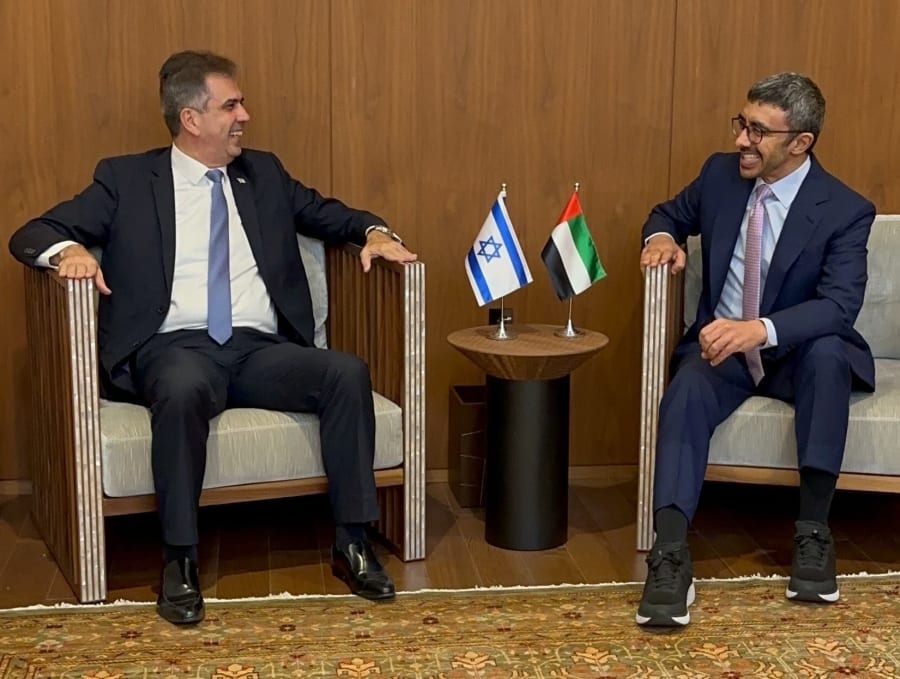Israeli and Emirati foreign ministers discuss 'groundbreaking projects,' progress in bilateral ties

United Arab Emirates Foreign Minister Abdullah bin Zayed Al Nahyan and his Israeli counterpart Eli Cohen met for the first time on Wednesday at the United Nations headquarters in New York.
The two top diplomats reportedly discussed the progress of Israeli-Emirati bilateral ties since the historic American-brokered Abraham Accords were signed in 2020. Israeli-Emirati normalization was quickly followed by three additional normalization agreements with Bahrain, Sudan and Morocco.
Israel's Foreign Ministry reported that the two ministers discussed the growing bilateral commercial and tourist relations between Israel and the UAE.
Cohen invited the Emirati foreign affairs minister to visit the Jewish state and bin Zayed said he was looking forward to greeting Cohen at the COP28 UN Global Climate Change Conference in Dubai in November.
Cohen revealed he and bin Zayed discussed “groundbreaking projects in the Middle East which include the land connectivity that will advance the entire region.”
Earlier this month, Cohen visited the UAE’s smaller neighbor Bahrain, where he attended the inauguration of the Israeli embassy. It was the Israeli foreign minister’s first visit to an Abraham Accords country.
Israeli Prime Minister Benjamin Netanyahu played a critical role in realizing the diplomatic normalization with the UAE and the three other Arab states in 2020.
While Emirati-Israeli ties remain strong, the UAE has reportedly become critical of the current hardline Netanyahu government’s policies in the West Bank and in Jerusalem.
Like much of the international community, the Emiratis are particularly troubled by the policies and statements made by National Security Minister Itamar Ben Gvir and Finance Minister Bezalel Smotrich, two controversial far-right Israeli politicians who have been accused of anti-Arab racism.
As a result, no senior UAE officials have visited the Jewish state since Netanyahu’s new government took office in December last year.
UAE Ambassador to the U.S. Yousef al-Otaiba who advanced the Abraham Accords, recently said the Israeli government’s West Bank policy was advancing “de facto annexation.”
“It’s tough because it is happening, and I think it’s happening in a way that is not visible and is going to make coming back to a two-state solution even more challenging,” al-Otaiba assessed.
While the UAE has stated its disapproval of the current Israeli government’s West Bank policy, bilateral trade has continued to expand. Bilateral trade expanded dramatically from $885 million in 2021 to $2.5 billion in 2022. In March, Israel and the UAE signed the final part of the bilateral free trade agreement, which covers items such as medical equipment, cosmetics and agriculture products.
Netanyahu praised the signing of the bilateral free trade agreement.
“The historic peace accord we signed with the UAE continues to bear fruit for the benefit of the citizens of both countries,” stated Netanyahu. “I am positive that we will continue to expand Israel’s circle of peace with other regional neighbors."
The UAE is also strengthening its ties with the Arab-Israeli minority community that makes up approximately 20% of the Israeli population.
UAE Ambassador to Israel Mohammed Al Khaja recently met with the Arab-Israeli Knesset Member Mansour Abbas of the Ra'am party to discuss growing cooperation between the UAE and the Arab-Israeli community.

The All Israel News Staff is a team of journalists in Israel.













